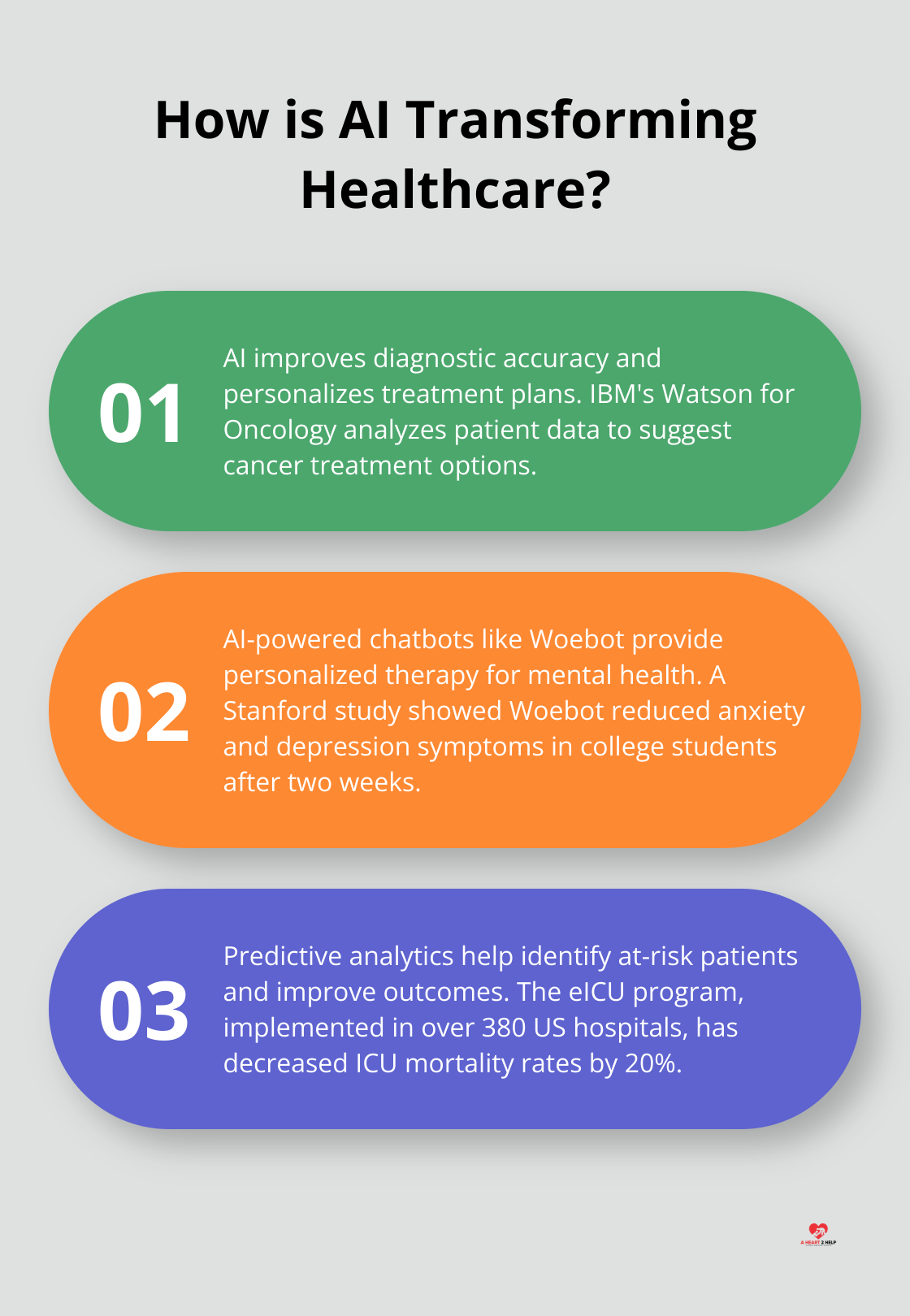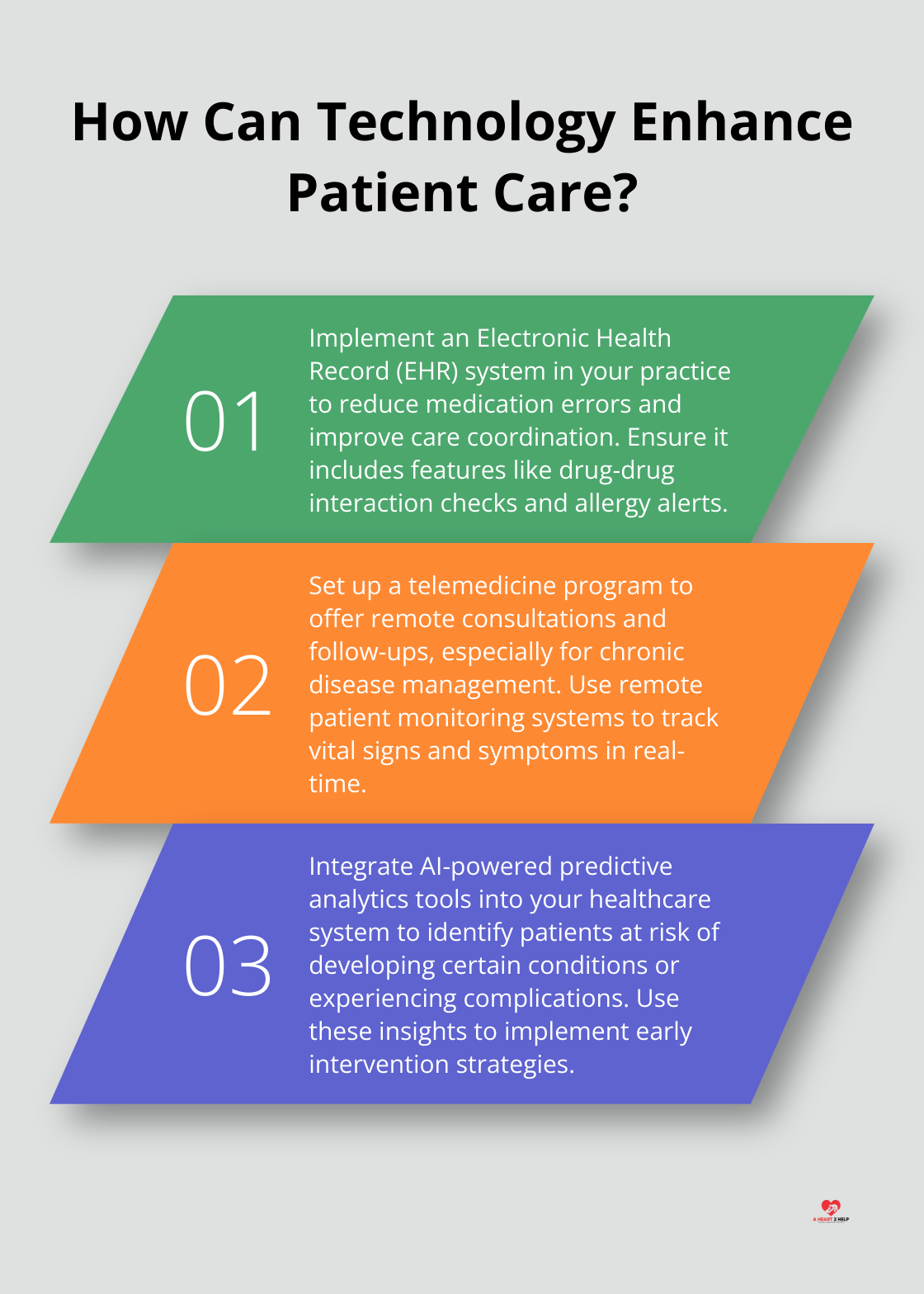Technology is revolutionizing healthcare, and at A Heart 2 Help, we’re excited about its potential to transform patient care. From electronic health records to telemedicine and artificial intelligence, these innovations are reshaping how medical professionals deliver services.
Improving patient care through technology isn’t just a buzzword – it’s a reality that’s making healthcare more accessible, efficient, and personalized. In this post, we’ll explore how these advancements are enhancing patient outcomes and shaping the future of healthcare.
How EHRs Transform Patient Care
Electronic Health Records (EHRs) have become the backbone of modern healthcare, revolutionizing patient information management and care delivery. These digital systems offer numerous benefits that significantly improve patient outcomes and streamline healthcare processes.
Instant Access to Comprehensive Patient Histories
EHRs provide immediate access to a patient’s complete medical history, which proves invaluable in emergency situations. A study found that EHRs can improve access to patient information, enabling faster and more informed decision-making. This rapid access can make a critical difference in life-threatening situations, allowing healthcare providers to act swiftly and confidently.
Reduction of Medication Errors
EHRs play a crucial role in preventing medication errors. These systems automatically flag potential drug interactions, allergies, and incorrect dosages, providing an essential safety net for patients. This feature not only improves patient safety but also reduces the risk of malpractice claims against healthcare providers.
Enhanced Care Coordination
EHRs break down information silos between healthcare providers, fostering improved care coordination. This seamless information sharing ensures all healthcare team members remain on the same page, leading to more cohesive and effective treatment plans.
Improved Patient Engagement
EHRs empower patients to take an active role in their healthcare. Many EHR systems include patient portals that allow individuals to access their medical records, view test results, and communicate with their healthcare providers. This increased transparency and accessibility foster better patient engagement and adherence to treatment plans.
Data-Driven Decision Making
The wealth of data collected through EHRs enables healthcare providers to make more informed decisions. By analyzing trends and patterns in patient data, providers can identify potential health risks early and implement preventive measures. This data-driven approach to healthcare (often referred to as “population health management”) has the potential to improve overall health outcomes and reduce healthcare costs.

As we move towards more advanced healthcare technologies, EHRs will undoubtedly continue to evolve and play an even more significant role in shaping patient care. The next frontier in healthcare technology builds upon the foundation laid by EHRs: telemedicine and remote patient monitoring. These innovations further extend the reach and effectiveness of healthcare services, bringing care directly to patients’ homes.
How Telemedicine Transforms Healthcare Delivery
Telemedicine has emerged as a game-changer in healthcare, breaking down geographical barriers and bringing medical expertise directly to patients’ homes. This technology-driven approach to healthcare delivery reshapes how we think about access to medical services, especially for those in remote or underserved areas.
Bridging the Healthcare Gap
Telemedicine significantly expands access to healthcare services, particularly for rural populations. This approach focuses on comparative analysis of telemedicine usage patterns among adult populations living in rural and urban areas. The widespread adoption of telemedicine leads to faster diagnoses and treatment initiation, potentially saving lives in critical situations.
Managing Chronic Conditions Remotely
For patients with chronic diseases, telemedicine offers a lifeline. Remote monitoring devices allow healthcare providers to track vital signs, medication adherence, and symptoms without requiring frequent in-person visits. Studies have shown the implementation of these devices for patients with chronic diseases in the primary health care context, mainly for cardiac, respiratory, or metabolic pathologies.
Continuous Monitoring Reduces Readmissions
One of the most promising aspects of telemedicine is its potential to reduce hospital readmissions. Continuous monitoring of patients post-discharge enables healthcare providers to identify and address complications early.
Beyond Video Consultations
Telemedicine encompasses a wide range of technologies and approaches that revolutionize patient care. From wearable devices that track heart rates and blood glucose levels to smartphone apps that remind patients to take their medications, these tools empower individuals to take control of their health.
The Future of Telemedicine
The integration of telemedicine with other advanced technologies (like artificial intelligence and machine learning) promises even greater improvements in patient care. These innovations will not only enhance the accuracy of remote diagnoses but also enable more personalized treatment plans based on real-time data analysis. As we move forward, the next frontier in healthcare technology builds upon the foundation laid by telemedicine: artificial intelligence and machine learning in healthcare. These cutting-edge technologies promise to further revolutionize patient care and treatment outcomes.

AI in Healthcare: Revolutionizing Patient Care
Artificial Intelligence (AI) and Machine Learning (ML) transform healthcare, offering unprecedented opportunities to enhance patient care. These technologies are not futuristic concepts but practical tools that already make a significant impact in medical settings worldwide.
Enhancing Diagnostic Accuracy
AI-powered diagnostic tools revolutionize the way medical professionals detect and diagnose diseases. A study published in Nature Medicine showed that an AI system outperformed human radiologists in detecting breast cancer, reducing false positives by 5.7% and false negatives by 9.4%. This level of accuracy can lead to earlier detection and treatment, potentially saving countless lives.

AI algorithms analyze medical images (such as X-rays, MRIs, and CT scans) with remarkable speed and precision. These systems identify subtle patterns and anomalies that might escape the human eye, providing valuable second opinions to healthcare providers.
Personalized Treatment Plans
AI ushers in an era of personalized medicine, where treatment plans are tailored to individual patients based on their unique genetic makeup, lifestyle, and environmental factors. IBM’s Watson for Oncology, for example, analyzes a patient’s medical records and current medical literature to suggest personalized treatment options for cancer patients.
This personalization extends beyond treatment selection. AI algorithms predict how patients will respond to specific medications, helping doctors choose the most effective drugs with the least side effects. A study in the Journal of Clinical Oncology demonstrated that AI-guided treatment plans resulted in a 30% improvement in patient outcomes compared to standard care.
Predictive Analytics for Early Intervention
One of the most promising applications of AI in healthcare is its ability to predict health issues before they become critical. AI-enabled electrocardiogram (AI-ECG) analysis can effectively predict right-side heart issues, demonstrating the potential of AI in early detection and intervention.
Researchers at Mount Sinai Hospital developed an AI system that can predict the onset of sepsis up to 12 hours before traditional diagnosis methods. This early warning system allows medical teams to intervene sooner, potentially reducing mortality rates and improving patient outcomes.
Ethical Considerations in AI Healthcare
The potential of AI in healthcare is vast, but it’s important to address ethical considerations. Data privacy and algorithmic bias are two key areas that require careful attention as we integrate AI into healthcare systems.
Healthcare providers must ensure that patient data used to train AI models is properly anonymized and protected. Additionally, developers must work to eliminate biases in AI algorithms that could lead to disparities in care for different demographic groups.
The Future of AI in Healthcare
As AI continues to evolve, its impact on healthcare will only grow. Future applications may include AI-powered virtual health assistants, advanced drug discovery processes, and even robotic surgery assistants. These technologies have the potential to further improve patient outcomes, reduce healthcare costs, and increase access to quality care.
Final Thoughts
Technology revolutionizes healthcare delivery, improving patient care through advanced systems and tools. Electronic Health Records, telemedicine, and Artificial Intelligence enhance decision-making, accessibility, and treatment personalization. These innovations complement the irreplaceable human element in healthcare, augmenting the compassionate care provided by medical professionals.

The future of healthcare technology promises exciting developments, from AI-powered virtual assistants to advanced robotic surgery. We must address ethical considerations like data privacy and algorithmic bias to ensure responsible implementation. These advancements will continue to improve patient outcomes and healthcare efficiency.
At A Heart 2 Help, we harness technology to foster compassion and support in communities worldwide. Our care-app connects those in need with compassionate volunteers, making it easier to offer and receive help. We remain committed to innovating in healthcare technology, always focusing on providing better, more accessible, and personalized care for all patients.
